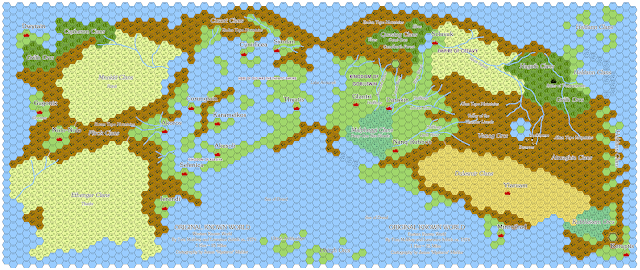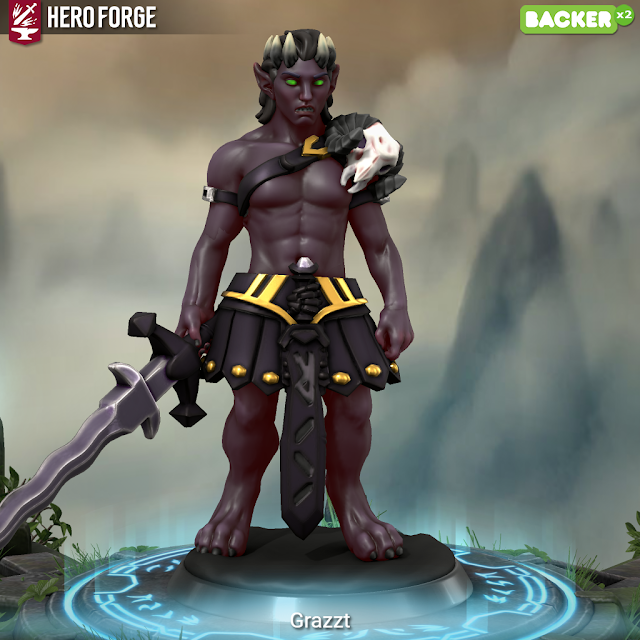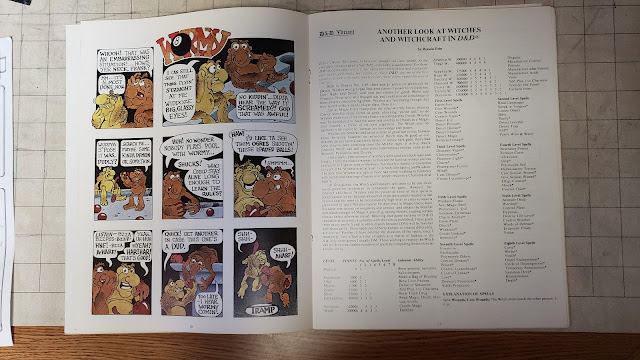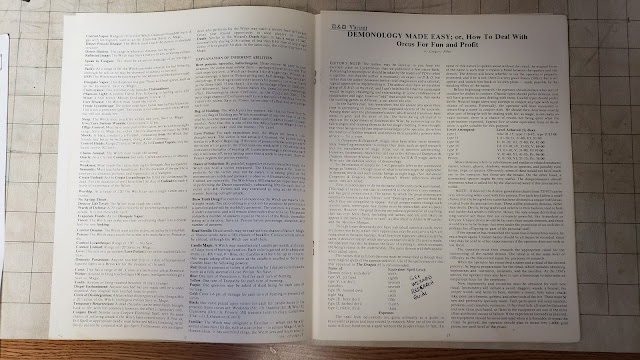This issue comes to us from November 1978, exactly one year before I would discover D&D. The cover is a Halloween-inspired one, and frankly, I think it is great. It has a Ravenloft feel to it, five years early. It's one of those that rewards you the more you look into it. I can't tell who did it though. I want to say Tom Wham.
I also should point out that this isn't "Dragon #20" this is "The Dragon #20".
We learn from Tim Kask's editorial that the price of The Dragon has gone up to $2.00 per issue. Plus they are going to a new printer for color, things look better, but there is a cost. Out on a Limb is coming back and I guess it was "controversial."
Up first Marc Miller talks about his game Imperium, described as "1977's Game of the Year." He gives us a bit of history of how the game was created and it completely invokes all my Traveller Envy. Marc follows this up with some rules addendums.
Some reprinted editorials from Gygax; Dragon Rumbles #19. Largely about Gen Con and Origins. Gen Con is expanding and having growing pains.
Speaking of expanding, TSR is looking for a new assistant to Gary Gygax. You need to have good typing, spelling, and proofreading skills. I wonder who got the job? I have my guesses.
Mike Crane has a nice random table of various Eyes and Amulets for Empire of the Petal Throne. Easily adaptable to D&D of course, if I knew what any of them actually did.
Nice big ad for Star Trek minis, 75mm versions at $10.95 each.
Jerome Arkenberg is up with a great one, The Mythos of Polynesia for Dungeons & Dragons. The format is similar to what we find in "Gods, Demigods, and Heroes." It is detailed enough for me to do a One Man's God for it but I know so little about these myths. The gods themselves are an interesting lot. Of them all, I knew Pele and Tangoroa the best.
Wormy is next and in full color.
Ah. Here is the reason why I bought this issue.
Another Look at Witches and Witchcraft in D&D by Ronald Pehr. This article is a sequel to the article from Dragon #5, and the prequel to the ones in Dragons #43 and #114. This one is more detailed than the one found in TD#5. This one still has the disclaimer of an "NPC Class" but offers it as a potential PC class for some DM's games. This one also makes the connection that witches are to magic-users as druids are to clerics. The author does point out that a witch is typically neutral although individuals can be good or evil as they please. They are not Satan/Devil worshipers even if they can summon supernatural assistance. The author points out that Cleric, Druids, and Magic-users can summon the same sort of aid. He also dismisses the stereotype that all witches are solitary old hags indicating they need to be to work with others and in harmony with nature so a Charisma of 9 is needed at the minimum.
Presented here are 18 levels in OD&D format. They have saves and attack rolls like that of the Magic-user but require more XP, 3,000 points needed for level 2 and it scales on from there. This witch gains several powers per level as well. Why making a Bag of Holding comes before the more stereotypical Brew Love Potion I don't know, I do know that even I think this witch is pretty damn powerful.
This witch also has spells up to the 8th level. This has always felt right to me as being between the Cleric and the Magic-user. Even in modern games where every spellcasting class has access to 9th level spells I still like the idea that Wizards/Magic-users have access to greater magics, even above my beloved witches. She may be limited to "only" 8th level spells here, but some of these spells...damn. "Destroy Life Level." "Wither," "Circle of Distegreation." I don't recall if all of these made it forward to issues #45 or #114, but they are some pretty powerful spells.
The first part covers two pages then it is continued on for a quarter page later in the magazine. What strikes me the most is not how really overpowered this class is (it was toned down in #45 and #114), or the casual sexism in the presentation ("it provides a very viable character for ladies," it was 1978 after all), but the fact that this was the headlining article and there is no art associated with it.
This version of the witch is the one I have typically associated with Holme's Basic set. Mostly because they share a publication time. This fits since the witch from The Dragon #5 is very obviously an OD&D witch and the one from Dragon #45 is connected to the Moldvay Basic game. Also because of the time of publication and because Tom Moldvay did a bit of the editing on that version. This leaves the obvious connection of Dragon #114 with AD&D 1st ed.
I suppose my collection of Dragon MAgazine witches is complete, more or less. I do not have a copy of The Dragon #5, the first witch, but I do have the reprint in Best of the Dragon Vol. 1 which is identical to what was in #5.
The second reason I wanted this issue, Demonology made easy; or, How To Deal With Orcus For Fun and Profit by Gregory Rihn. This article also calls back to The Dragon #5, in particular the article on Spell Research in D&D (also in the Best of Vol. 1). The editor reminds us that the author, Gregory Rihn also gave us a great article on lycanthropy (again, in the Best of Vol. 1) so they feel this is a worthwhile article. This article is good. It covers the reasons why a magic-user might want to summon a demon in D&D and then how to do it! Take a moment to breathe that one in. The Satanic Panic was just about to happen.
There is a lot of detail here and a lot of really awesome role-playability. I mean really if your wizard or witch hasn't tried summoning some evil from the deeper dark are they REALLY living? There are even guidelines to what needs to be in the rituals (new vestments, items, even sacrifices) and what sort of tasks of the demon can be demanded.
This article, plus the witchcraft one, when combined can be used to add a lot of flavor to the Warlocks of D&D 5.
Halfway, we get some photos of the various winners of awards for 1977 at Gen Con XI. Pictures of John Holmes, his son Chris as well as awards presented by Elise Gygax to Marc Miller and Tim Kask among others.
See Africa and Die! Or, Mr. Stanley, Meet Dr. Livingstone comes to us from none other than Gary Gygax himself providing a review of the game Source of the Nile. IT is not only a pretty detailed review but also suggests some rule corrections. The review does make the game sound fun but this is the problem in reading 40-year-old+ game magazines. All the great stuff is long out of print and expensive as hell to find.
William B. Fawcett gives us a Traveller variant/addition in The Asimov Cluster. Traveller! Why must you haunt my every step! But seriously, this is the exact sort of thing I would read back in the day and make Traveller feel like this epic sweeping Space Opera. I am sure it is. I am sure there are people (and I have read their blogs) that are just obsessed with Traveller as I am with D&D who would read the D&D articles and wistfully say "someday. someday I'll play that game and it will be as epic as I imagined." I did play some Traveller, but mine never got epic. I don't even know which Traveller system to start with now if I wanted to get back into it. This is my "Sci-Fi" month. I should figure this one out.
Anyway, this article provides details on the Asimov Cluster with a lot of planets here to provide points of interest for your Traveller game.
A really cool ad for the D Series modules from TSR. I bet these will be cool. Followed by a preview of the Ralph Bakshi "Lord of the Rings" movie.
Lyle Fitzgerald gives us a breakdown of character death in It's a Good Day to Die (Death Statistics of D&D Players). I should note that these are statistics only from his local gaming group. And it is not Players that are dead but rather Characters. Though props for using this as a title 10 years before Worf would utter the same words. Though like most things it is better in the original Klingon. It's an interesting read and might even be a good snapshot of the times. Maybe I'll create a poll one day to get some more data. Not that I honestly care much about character death, I just like statistics.
Allen Hammack, a very prolific Dragon writer back in the day, has a rule variant for hidden movement in the War of the Ring game.
Finieous Fingers is up. People talk about being able to judge the generations of games by their feelings on Tracy Hickman. I also say you can make the same judgment on the generations just prior to that on their opinion of FF. It's fun, but does not fill me with nostalgia.
The Convention Schedule fills a quarter of a page. In a couple of years, it will expand to several pages.
Our last article is about Demonic Possession in the Dungeon from Charles Sagui, a name I don't think I have seen before. It's a good guide and, as the author points out, something not used enough in games with demons. This article presents demonic possession as sort of a trap to be found in dungeons (well, that is the title after all) and a good use of it. Reading this it is easy to expand on it a little more and get your Regan and Captain Howdy types.
A nice big ad for the new Advanced Dungeons & Dragons Player's Handbook.
Back cover is an add for the Space Gamer magazine.
Counting covers a total of 36 pages, but a lot has been packed into these pages.
It is interesting to read a Dragon from this time period when I was imprinted on Dragon from the Kim Mohan/80s period. This one feels a little more like a White Dwarf magazine to me. If you are curious, White Dwarf #9 was published around the same time.
Also there is a feeling of embracing more games here. It feels like gamers were far more open about trying out other games than with what some of the older gamers today would lead you to believe. This is also consistent with how we all played back then.
So yeah. I paid a lot of money for this issue and I don't regret it at all really. I still have my Dragon CD-ROM with all the PDF files, but having this in my collection is still worthwhile in my mind.







































